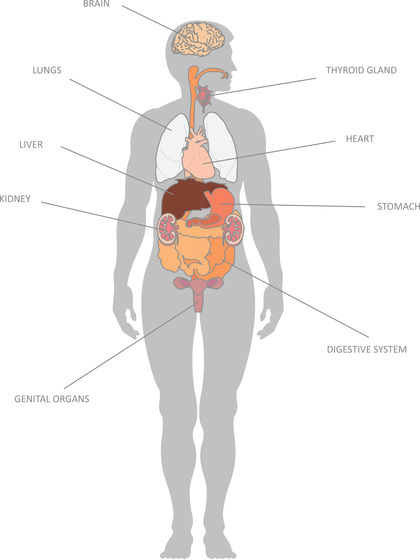The Digestive System - Taking care: keeping the digestive system healthy

The body is wholly dependent on the digestive system to provide it with the nutrients—fluids, carbohydrates, proteins, lipids, vitamins, and minerals—it needs to continue to function. If the digestive system fails to do this because it is not functioning properly, the entire body suffers.
A healthy lifestyle will keep the digestive system healthy. This includes following a proper diet, exercising regularly, maintaining a healthy weight, not smoking, drinking alcohol only in moderation, and reducing stress.
Tapeworms are parasites (organisms that live in or on other kinds of organisms) that live in the intestinal tracts of some animals. There are three major species of tapeworms that can infect humans. They are typically acquired from eating raw or undercooked beef, pork, or fish.
Tapeworm eggs are passed along in feces. When improperly treated human sewage is used to fertilize pastures or crops, pigs and cattle can become infected with the eggs. They can also become infected from drinking contaminated water. Freshwater fish become infected when human feces contaminates their water source.
The tapeworm eggs develop into larvae in the infected animals and fish. When humans eat the meat from those animals and fish without properly cooking it, they become infected. The tapeworm travels to the intestine, attaching itself to the inner lining by hooks on its head. If not treated, the tapeworm may stay in the intestine for years, absorbing nutrients through its outer covering. It may grow up to 30 feet (9 meters) in length.
Most individuals infected with a tapeworm have no symptoms. Some, however, may experience pain in the upper abdomen, diarrhea, unexplained weight loss, and weakness. A tapeworm's eggs or worn body parts that appear in an individual's feces are often the only sign of an infection.
Tapeworms are easily treated with medication. Practicing good hygiene and avoiding raw or undercooked meat or fish are important steps in preventing a tapeworm infection.
The "Food Guide" Pyramid developed by the U.S. Departments of Agriculture and Health and Human Services provides easy-to-follow guidelines for a proper diet. In general, foods that are low in fat (especially saturated fat), low in cholesterol, and high in fiber should be eaten. Fiber is especially important in maintaining the workings of the intestines. Fat should make up no more than 30 percent of a person's total daily calorie intake. Breads, cereals, pastas, fruits, and vegetables should form the bulk of a person's diet; meat, fish, nuts, and cheese and other dairy products should make up a lesser portion. Drinking fluids, especially water, helps move material through the digestive system.
Long-term ingestion of cigarette fumes, excessive alcohol, and spicy foods can cause serious damage to the digestive system. Toxins that are taken into the body by way of the mouth are absorbed by the digestive tract and transported to the liver, which can suffer permanent damage. Many medications can injure the lining of the esophagus, stomach, and intestines. Medicines in pill or capsule form should always be taken with plenty of water.
Teeth are an important, yet often overlooked, part of the digestive system. They begin the entire process of digestion. Oral hygiene is, therefore, a primary concern. The best way to prevent tooth decay is to brush the teeth at least twice a day, preferably after every meal and snack. The teeth should also be flossed daily to help prevent gum disease.
Minor irritations of the digestive system are common. Occasional diarrhea, constipation, or excessive gas is to be expected. Often, they are treated with nonprescription drugs. However, if these or any digestive problems persist, they should not be ignored and medical attention should be sought.

Comment about this article, ask questions, or add new information about this topic: